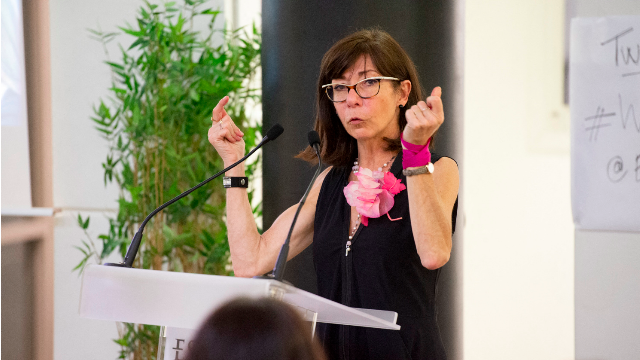Confinement: ESSEC Takes Action Against Online Discrimination
Pressure exacerbated by confinement can ratchet up tension and lead to hate speech on social media. Viviane de Beaufort, ESSEC academic advisor on respect for others, talks about measures the school takes to support students who are targeted by or who see racist, sexist or homophobic comments online.
ESSEC Alumni: What is your role as advisor on respect for others?
Viviane de Beaufort: I have served as advisor on Gender Equality for ESSEC at the Conférence des Grandes Écoles since 2014. In 2018, I suggested to management that we adopt a more global approach and was delighted when they agreed. Sexism is one of many types of disrespect and responding to this issue enables us to address other disrespectful behaviours that our school cannot tolerate given our values.
This led us to expand our work on the notion of respect for others with all ESSEC stakeholders, which led to the creation of a Charter condemning all hateful or disrespectful speech or behaviour, as well as all discrimination based on sex, gender, religion, origin or political opinions. Each member of the student community and the faculty and administrative staff signed this document when they arrived at the school. As a jurist, I thought it was essential to adopt a shared code of values.
EA: Do you limit your involvement to behaviours that happen in the school context?
V. de Beaufort: In essence, our work is focused first on student life events and classes, as well as meetings and emails between members of the ESSEC community. But community members also contact each other on social media, so we do our best to have a presence there as well, to the extent that more and more students have started alerting us to hateful, or simply inappropriate, posts. In addition, we pay attention to any problems encountered during internships, apprenticeships and university discussions, even if we don’t have direct control over these areas. ESSEC never tries to avoid responsibility.
EA: Has your team been called on to address problematic behaviours since lockdown began?
V. de Beaufort: In particular, we have reacted to inappropriate comments targeting the Chinese community with accusations that it is responsible for the coronavirus crisis. Naturally, our response was immediate and firm. More broadly, we pay special attention to the mental state of those who are most isolated, particularly those confined to accommodation halls. The BDE has been participating in this effort in a very constructive way by regularly offering classes, conferences and other events online for their classmates to break the isolation.
EA: What measures are available to people who contact you?
V. de Beaufort: Victims and witnesses can confidentially contact trained advisors. There are around 30 of them and they are in all programme areas, from post-secondary education to professional development. (The list of advisors is available on the MyESSEC intranet.) These advisors also have access to psychological counsellors. An ad hoc committee addresses each case in order to take the appropriate measures, including sanctions if necessary, while following the proportionality principle and presuming innocence. When the case falls under a criminal classification, which has happened once since this system was launched, the committee explains to the victim how to file a report and, if necessary, management takes civil action.
EA: Has this system proven itself?
V. de Beaufort: There is always room for growth, but we have diligently processed 20 or so complaints received since June 2019 for sexist practices, racist comments, discrimination, inappropriate humour or behaviours, as well as moral harassment. The complaints have involved students, as well as professors and staff. Depending on the situation, the authors apologised, destroyed incriminating materials or voluntarily accepted temporary separation measures. For the most serious cases, the culprit made specific commitments and is still under surveillance. They will be sent to the disciplinary board or even expelled for any further misconduct. But, above all, I believe in awareness and prevention!
EA: What is your message to ESSEC students in the context of lockdown?
V. de Beaufort: Think about what simple things each of you can do to reach out to your classmates. And, if you aren’t doing well, be sure to tell your professors as they are all aware of the problem and ready to serve as mentors or to alert ESSEC Alumni.
Interview by Louis Armengaud Wurmser (E10), Content Manager at ESSEC Alumni.
Have you found other ESSEC initiatives related to coronavirus? Feel free to share them in the Best practices & mutual support during COVID-19 crisis group!
Would you like to request help from alumni or offer support to others during the crisis? Check out the ESSEC Alumni COVID-19 mutual support group!
Want to read more? Please join ESSEC Alumni for us to be able to bring other quality contents about the community to you.

Comments0
Please log in to see or add a comment
Suggested Articles



